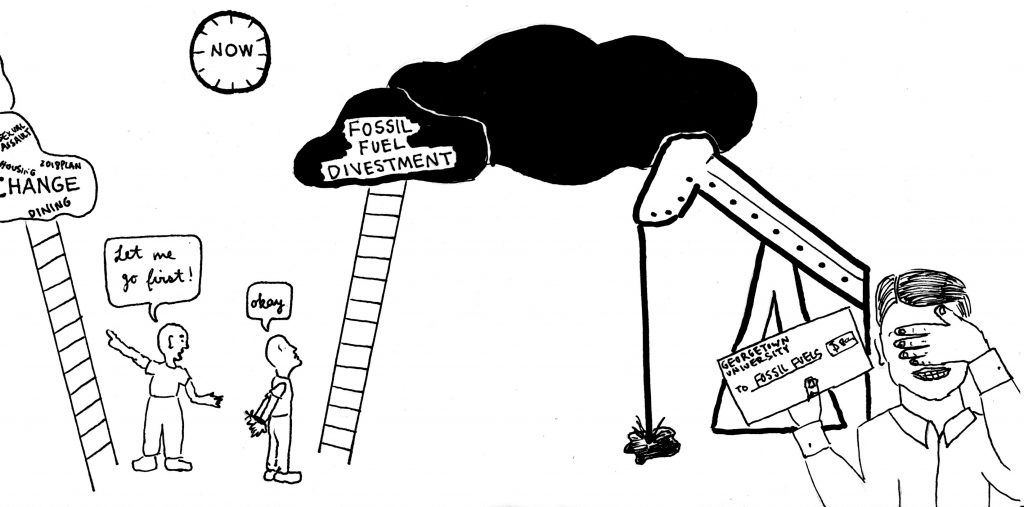In mid-November, the GUSA Senate voted against having a referendum on divestment appear on the spring executive ballot. As a non-binding poll of collective opinion, this referendum would have allowed students the opportunity to show support for or disapproval of fossil fuel divestment. By vetoing this measure, the GUSA Senate effectively denied students the right to voice this opinion.
The referendum was meant to highlight the importance of student voices on the topic of divestment. In June 2015, Georgetown’s Board of Directors voted to partially divest the University’s endowment from direct holdings in coal only. Though students had worked on a proposal for divestment for two years through the proper channels, it was an immense struggle to get divestment on the table as a consideration during the Board meeting in June. Once the student-authored proposal was put on the Board agenda, students were not allowed a voice in the Board meeting or even allowed to explain their proposal and answer questions to the full Board. As stakeholders at this University, students should have the right and responsibility to have a seat on important University decisions such as divestment. Not only do we pay tuition, but we also provide the sole purpose for the University’s existence. I am not arguing that students should always get their way, but denying our right to voice our collective opinion on these issues in an impactful way means denying our own importance at this institution. The referendum, on the other hand, would have been a student-driven method to allow students this means of group expression.
During the first Senate meeting at which this referendum was discussed, senators also expressed concern that the referendum included biased language. However, the final version of this referendum, presented to the Senate in the second meeting to discuss this measure, had been edited to remove potentially biased language and had even had a GUSA senator’s edits.
Senators also worried that a referendum on divestment would take away from other, timelier issues being discussed on campus (e.g., sexual assault policy reform, race on Georgetown’s campus). I agree that all of these issues need attention, especially considering recent social events around the country, but divestment would not take away from these topics. Instead, divestment stands as another intersectional social justice issue that needs to be addressed. Georgetown students are intelligent and are more than capable of considering multiple issues at the same time. If the GUSA Senate was concerned about a lack of bandwidth to fully address all issues that students care about, the solution is not to start knocking issues off the docket, thereby reducing the ability of students to exercise their constitutionally-guaranteed right to be involved “with the Governance of the University.”
Moreover, GUSA senators also voiced that divestment, being a complicated issue, would require substantial education for the student body and as such should not be on the referendum. In order to address these concerns, third-party groups volunteered to write and disseminate an unbiased, educational packet on divestment. The Senate chose to reject this measure. Furthermore, students are capable of doing their own research when forming their opinions on divestment. These sources of education would surely have been sufficient to ameliorate the concerns of the GUSA Senate.
Lastly, senators thought that the referendum on an Executive ballot would “politicize” the issue of divestment. The problem is that divestment is already a political issue; whether a referendum occurred before, during, or after the GUSA Executive Election, the GUSA Executive would be asked about the issue and would have to develop a position in regards to it. Further, fossil fuel divestment is an issue that relates to the student body and that is garnering discussions both globally and locally. Our elected student officials should ultimately have some position on it.
 A referendum of the student body would have given students, important stakeholders in this university, the chance to express their positions on
A referendum of the student body would have given students, important stakeholders in this university, the chance to express their positions on
this issue. In light of recent news, including evidence of ExxonMobil’s cover up of the devastating effects of fossil fuels, the Paris climate talks in December, and escalation of divestment campaigns across the country, divestment has become a polarizing issue on many college campuses including this one. What is unclear, however, is the extent to which students agree with divestment as a policy change. A referendum of the entire student body would have been the most accurate means by which the opinions of the student body can be measured, because it would give every undergraduate student the opportunity to say “Yes, I am in favor of this,” or “No, I am not.” By rejecting a referendum, GUSA impeded students from expressing their support or dissent on this timely issue.
As students with the opportunity to attend such a prestigious university, we must leverage our position to help make our world a more habitable place for ourselves and for others. Divestment is one powerful tool that universities and institutions around the world have to help achieve this end, and one that has been successful in the past—such as in the Apartheid era. By leaving our investments in fossil fuel companies, we are making the choice to be complicit in the crimes of fossil fuel companies, the oppression of communities around the world, and the destruction of our planet. This is the reality of our situation. Either way, our investments take on a political and social meaning. We should choose instead to use our position, our money, and our influence to move our University and our world towards a more climate-friendly and just society, a decision that students should wholeheartedly be a part of.
Read this column’s paired Voices piece here.






